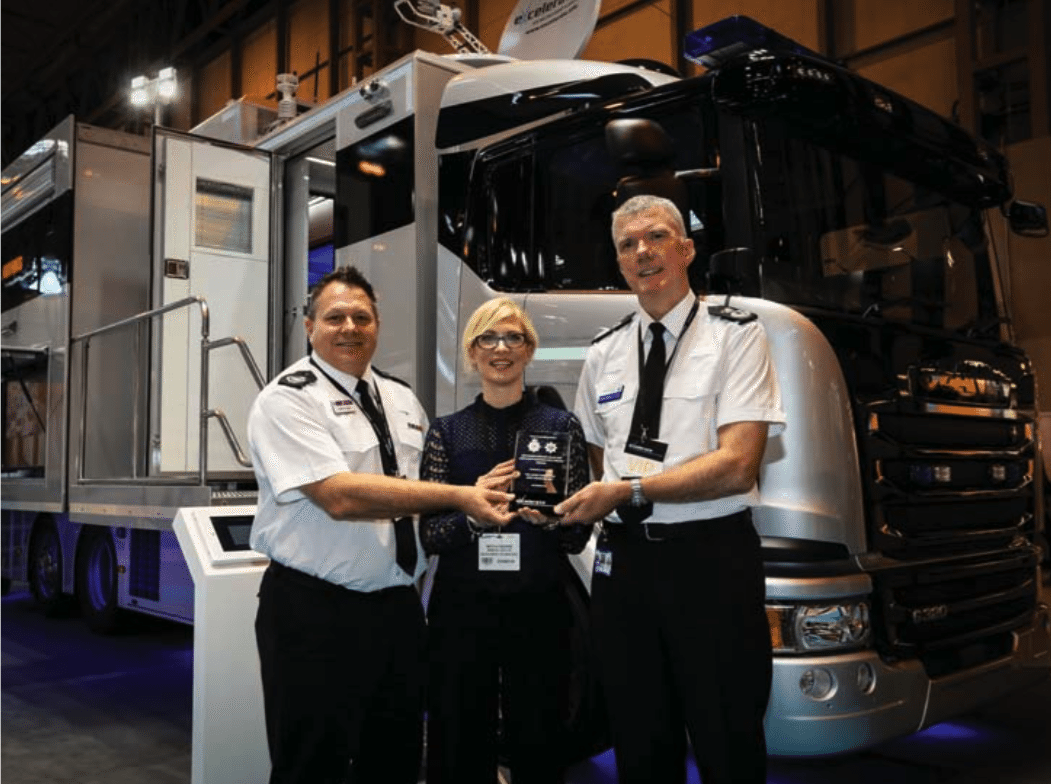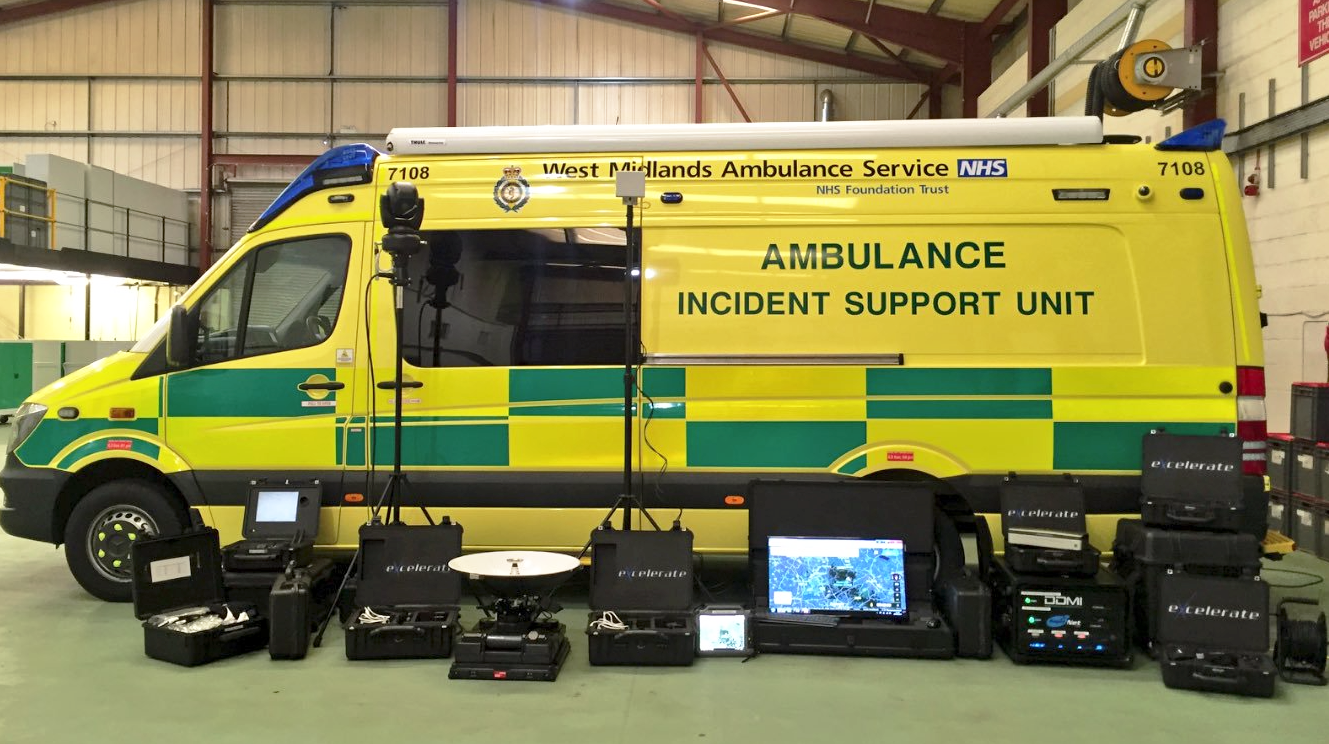Emergency Services Times speaks to Nicola Savage, Managing Director of Excelerate Technology, about how the global provider of real time data, video and voice via satellite and wireless solutions is working with the emergency services to enable greater collaboration.
Emergency Services Times (EST): Excelerate specialises in incident ground technology solutions. How does this support collaboration?
Nicola Savage (NS): Communication advancement in all our lives has significantly improved our access to information, the speed at which we receive it and our ability to communicate across dynamic applications. We don’t even need to example the emergency services – it is evident from the Smart technology devices and applications in our pockets, bags and on our wrists.
From an emergency services perspective, the demand for innovative technologies and solutions is forever growing, as is the need for more bandwidth; this combination is the platform on which Excelerate supports and enables future collaboration between people and organisations.
EST: As a provider of technology to the sector, what does ‘collaboration’ mean to you?
NS: Collaboration is a broad term that has been prominently promoted by the Government recently and is at the heart of probably the most significant reform across the public sector in a long time. This, of course, brings many challenges and is much wider in its scale than Excelerate’s area of expertise. It does, however, create an opportunity for improvements in areas where technology plays a role in enabling change across the emergency services.
It is essential that services look outside of the public sector to see where private sector suppliers can support, lead, facilitate and supply solutions, creating a platform that promotes engagement so that we can learn and develop solutions that underpin the core principles of any strategic programme.
I believe suppliers have a moral obligation to see how they too can add value, consultancy and expertise to support and enable these changes. This isn’t just the right thing to do but also the sensible and an essential thing to do. Enabling collaborative engagement will also allow for more transparency and an improved understanding of core requirements, which in turn will provide best value without compromising quality or resilience in the products, solutions and services required to support the functions and roles of the emergency services. This will also enhance the suppliers’ ability to provide solutions, applications and networks that are fully fit for purpose.
EST: Do you think the drive for greater collaboration among the emergency services has lost some of its impetus recently?
NS: Collaboration projects across the services have been taking place to some extent and success for years. From my own personal experience, I believe that the drive for collaboration is greater than ever. In fact the majority of projects in which I’m involved with Excelerate include discussions to support collaboration.
Some of the most successful projects are undertaken by organisations which are investing, not just financially, but which also understand the cultural and operational
complexities involved, with a view to improving them by creating platforms that meet their needs for today but are flexible enough to support and aid operational changes that might occur in the future. To achieve this success people at every level within the organisation have also invested in a journey of change.
However, in the current climate where financial efficiencies and pressures are also a key driver – adding to the challenge – there can be a negative short-term approach to investing in such projects as the pressure is on cost rather than investing or engaging in solutions that can deliver added operational value, increase capability and in turn deliver longer term cost efficiencies.
EST: Can the complexity of technology sometimes act to prevent or slow collaboration?
NS: The complexity isn’t an issue for us. We specialise in working with our customers to understand their requirements, enabling us to offer the most value by designing and integrating solutions that provide interoperability between existing and emerging technologies while also creating a foundation and common operational platform that can support future development within the operational environment.
With the right combination of people and expertise we have found nothing is too complicated to work through. If the end vision between collaborating parties is clear, Excelerate and other providers will work the complexities through and deliver solutions and options so that our customers can make a sound and informed investment.
I don’t believe that it is the complexity of technology that prevents or slows down collaboration. I believe in most cases where this happens it is the lack of understanding around what technology is available, and how it can support multiple organisational objectives. This requires better engagement and an improved understanding so that flexible solutions can be delivered across the sector. There cannot be a ‘one size fits all approach’ as each territory and sector has its own unique challenges, in addition to common ones.
The adoption of so much technology being used in our every day lives can add to the complexity but it can equally support innovative ways of working. Quite often what is at our disposal at home, is not yet fit for purpose to meet the demands or scrutiny of the public sector world, but through a combined approach that embraces the expertise and skills of both the customer and the provider, technology can and will continue to deliver improvements to any project.
At Excelerate, we have invested and built our businesses around understanding, researching and testing the world of technology and applications. It is our responsibility to work with the services to gain a clear understanding of their requirements and provide a solution that enables collaboration instead of preventing it. To achieve this also requires a collaborative approach. Engaging with organisations like ours will enable an informed approach to the provision of technology solutions that can be delivered against customer requirements.
“It is our responsibility to work with the services to gain a clear understanding of their requirements and provide a solution that enables collaboration instead of preventing it.”
EST: Are there any recent Excelerate projects that you believe highlight successful improvements in collaboration?
NS: There are many. Most of the projects we deliver are built on the foundation of enabling collaboration, they just vary in scale.
Two key and most recent projects would have to be the Joint Command Unit for Northamptonshire Police and Northamptonshire Fire and Rescue Service and the NHS Ambulance Services HART project. Both are significant in terms of how they are improving collaboration to meet their own individual objectives and provide enhanced services to the public.

Northamptonshire’s joint investment has enabled a shared asset to be implemented into the county, which can support single and multi-agency cooperation in addition to supporting operations across multiple disciplines ranging from (but not limited to) pre-planned events, hostage negotiation and incident response and management. I believe the success and potential future success of this project is based on an invested approach at every level. Everybody within the two organisations had an aligned vision and were working towards short, medium and long term strategies, enabling a flexible platform to support their existing operational model, in addition to embracing a solution that can support change and improvements in the way in which the services work together across a variety of operational scenarios.
HART is a significant national project that we have seen evolve and are privileged to have been awarded the national technology contract for the second time within the last decade. From its origination, patient care and how that is delivered through the support of resilient technology has always been at the forefront of this project. A national and unified approach, they have enabled a resilient and flexible common operational platform across all trusts in which to respond.
Over the last decade we have seen HART respond to lessons learned from major incidents such as 7/7 and embrace a resilient network of data, video and voice solutions, in addition to training and deploying paramedics to enhance patient response and care at major incidents. This ethos has continued within their second-generation project, which does not compromise on resilience but rather enables a more flexible deployment method across multiple incident scenarios, including flood response.
EST: What guidance would you give to today’s emergency services leaders in how they approach the use of technology to improve collaboration?
NS: Although collaboration brings challenges, I believe it also brings opportunities to improve and change how we operate and communicate.
Technology can support collaboration. However, this can only be achieved by matching technology solutions to user requirements and through services collaborating with the wider market so suppliers and services can work together to achieve the objectives of collaboration.
We believe that in order to deliver solutions that improve better value over the life of contracts, in addition to being fully fit for purpose, a more transparent and collaborative strategy is required with end user organisations and project teams.
This in turn will remove the ambiguity that leads to failings within the procurement of projects, particularly ICT projects, and enable an improved process to support due diligence, negotiation and, above all else, the ability to implement solutions that meet expectations and support public sector organisations with operational tools and applications that enable them to deliver an improved and reliable service.
Contact us now for more information
Telephone: +44(0) 845 65 85 747
or click here







